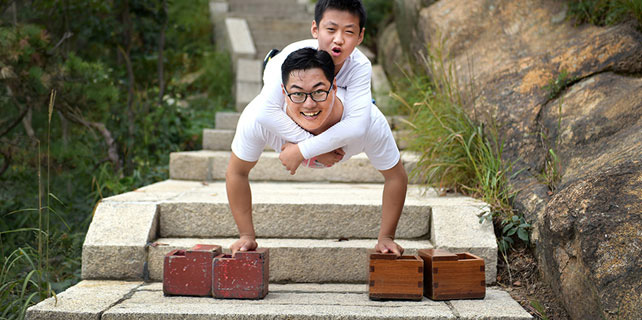Giving the cold season a warm welcome
"White opium"
Citing the addictive fun of skiing, some young Chinese enthusiasts have dubbed the sport "white opium" because their bodies itch for action every year when the snow season approaches.
The crowded scenes at major ski resorts around Beijing in late November signified China's surging appetite for the sport, which was introduced in the early 2000s.
When the Jundushan Ski Resort in the northern suburb of Changping opened trial operations on Nov 25, general manager Qiao Wei was impressed by the large crowds lining up in the reception hall to check in, and by the long lines of skiers waiting to take cable lifts to the top of the trails.
"This year, we opened the resort as early as the weather permitted, but we didn't expect so many customers during our test run. It turned out to be a big surprise," he said.
Boasting a maximum capacity of 6,000 skiers on 150,000-sq-m of rugged terrain, Jundushan upgraded its cable lifts and purchased more high-end skiing and snowboarding equipment to prepare for peak business during the New Year holidays.
"The increasing number of advanced skiers among the health-conscious middle class has prompted us to provide better facilities and services. It is proof of the sport's rising profile," Qiao said.
According to the Beijing municipal winter sports administration, the city's 22 outdoor and indoor ski resorts registered 1.69 million visits during the 2015-16 snow season, the highest number nationwide.
Booming industry
As highlighted in Beijing's bid plan, China is rolling out a national campaign to encourage 300 million people to participate in winter sports by 2022.
The call has inspired greater investment in the winter recreation sector, which has seen 108 new ski resorts built since Beijing and its co-host Zhangjiakou, Hebei province, were awarded the Winter Games last year.
China has more than 200 skating rinks and 500 ski resorts spread across 25 provinces, and about 30 million people participate in winter sports and related activities, according to the General Administration of Sport of China, the country's top sports body.
In November, the administration and seven ministry-level departments - including the Ministry of Finance and the National Development and Reform Commission - issued long-term national plans for the development of winter sports and construction of infrastructure.
The country aims to build 650 skating rinks and 800 ski resorts by 2022, laying the foundations for the winter sports industry to generate 1 trillion yuan in gross revenue, including spending at venues, equipment production and training fees, by 2025.
Developers of winter sports venues will be offered reasonable and flexible policies on tax incentives and land acquisition, according to Wang Weidong, director of the administration's economics department. He said the administration will work with the Finance Ministry and the Ministry of Land and Resources to finalize the measures.
"The acceleration of the construction of winter sports facilities is not just about hosting elite competitions, but also to stimulate mass consumption in the sector," said Gao Zhidan, vice-minister of sport.
Despite the government's enthusiasm, experts have warned that the industry should be developed cautiously, with integrated planning and an emphasis on service and staff training.
"The investment in the industry is mainly for the 2022 Olympics, but what happens after the Games?" said Yang Hua, a sports sociology expert and the Party chief of Beijing Sport University.
"To avoid a waste of resources and operational difficulties after the Olympics, local governments and property developers should take local tourism, accommodations and environmental protection into consideration in the bigger picture," he said.
Yang's suggestion has been adopted by Yanqing county in northwest Beijing, the proposed venue of the Olympic alpine skiing, bobsled and skeleton competitions.
After signing a partnership agreement with Wanke Property Development Co earlier this year, Shijinglong Ski Resort in Yanqing, which was built in 1999, has been renovated and now boasts barrier-free facilities and an internet-based management system offering online booking, payment and customer reviews.
The service upgrades, such as requiring skiers to wear helmets - and providing 3,000 free helmets - have earned positive feedback since the resort reopened in early December.
"From facilities to services and security measures, we are committed to providing unique experiences for consumers that will make them want to come back," said Cheng Jia, the resort's assistant general manager.






















